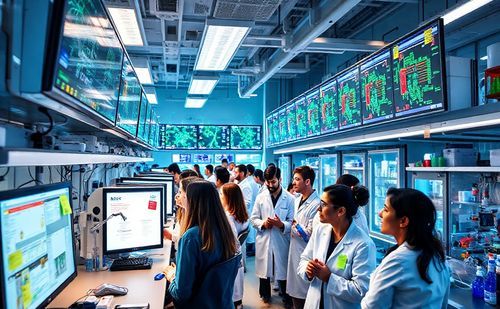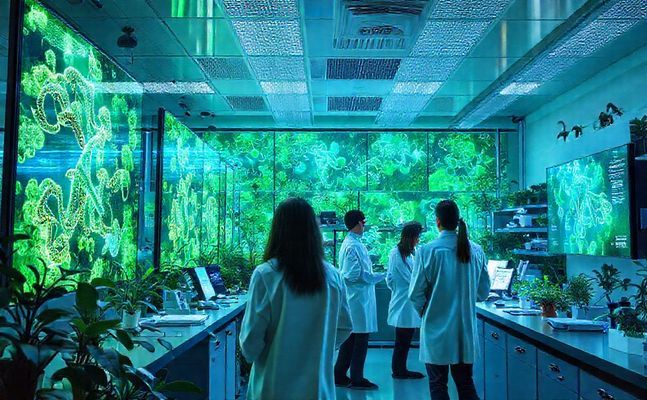The field of biotechnology stands on the precipice of a new era, thanks to the integration of digital biology into its processes. Digital biology merges computer science and biology in ways previously thought impossible. It enables researchers and developers to simulate biological processes and interactions with unprecedented accuracy.
At the core of this innovation are powerful algorithms, machine learning, and artificial intelligence (AI), which allow for the meticulous analysis of complex biological data. Tools like AlphaFold, developed by DeepMind, exemplify this revolution, providing insights into protein folding that were once elusive. Ultimately, digital biology is not merely an auxiliary tool but a foundational component that drives the future of biotech, paving the way for accelerated research, improved diagnostics, and novel therapeutic approaches.
Video: The GREAT Biotech Computer Revolution Is Here?
AlphaFold: Revolutionising Protein Folding Understanding
AlphaFold has garnered significant attention as a groundbreaking AI system capable of predicting protein structures with remarkable accuracy. Within months of its release, AlphaFold transformed the landscape of structural biology, enabling scientists to explore vast protein databases and facilitate drug design. The idea that we can now understand protein folding mechanisms at an atomic level could have profound implications for tackling various diseases. However, AlphaFold's contributions extend beyond merely providing structural insights; it promotes collaboration across the scientific community, inviting experts from diverse fields to leverage this tool in their research. Moreover, with AlphaFold's open-source model, the incorporation of community-driven improvements further enhances its potential, which could lead to the identification of new targets for drug development and therapeutic interventions.
**The Influence of Google's Artificial Intelligence on biotechnology**

Google's foray into AI and biotechnology has transformed how we approach life sciences and medical research. With its vast computational resources and expertise in machine learning, Google is actively engaged in numerous biotech projects aimed at solving complex biological problems. The utilisation of AI in genomics has led to advances in understanding genetic variations and their relationship to diseases. Google Cloud's AI and machine learning capabilities allow researchers to analyse enormous datasets rapidly, uncovering trends and correlations that were previously impractical to identify. Additionally, partnerships between tech giants and biotech firms signal a growing recognition of AI's vital role in this field, pushing the envelope in drug discovery and personalised medicine. As the boundaries of what AI can achieve expand, so does its ability to create smarter and more efficient biotechnological solutions.
The Potential of Quantum AI in Biotechnology
Quantum computing is poised to become a game-changer in biotechnology, leveraging the principles of quantum mechanics to process information at speeds unfathomable with classical computers. The intersection of quantum computing and AI has the potential to solve complex problems related to protein folding, molecular interactions, and drug development. By harnessing quantum AI, researchers could simulate and analyse biological systems with unprecedented precision, thereby uncovering insights that could lead to breakthroughs in treatment for diseases like cancer or neurodegenerative disorders. Though we're in the early stages of this technology, pilot projects and collaborations between quantum computing firms and biotech researchers are emerging, laying the groundwork for future advancements. As capabilities evolve, quantum AI could revolutionise biopharmaceutical development, drastically reducing time and costs associated with traditional methods.
Challenges and Ethical Considerations in Digital Biology

As digital biology continues to expand, it brings to the forefront numerous challenges and ethical considerations that cannot be overlooked. Concerns regarding data privacy, intellectual property rights, and the fair use of AI models arise as biological data becomes increasingly digital. Moreover, the implications of AI-generated biological insights present unique ethical dilemmas, particularly around genetic manipulation and the potential for unintended consequences in ecosystems and human health. Regulatory frameworks are still catching up to the rapid advancements in technology, raising questions about how we can ensure the responsible development and deployment of these innovations. It is vital that the scientific community, legislators, and tech companies collaborate to establish guidelines that mitigate risks while fostering innovation and protecting public health.
Fun Facts About Digital Biology and AI Innovations
The integration of digital biology and AI technologies has produced some fascinating developments in recent years. Did you know that AlphaFold predicted the structure of a record 200 million proteins in just a few days after being launched? This vast dataset now serves as a rich resource for researchers. Furthermore, Google has been at the forefront in applying AI for predicting protein structures and even in developing new possibilities in cancer treatment planning.
The Rise of Digital Biology in Biotech Innovation
Fascinatingly, quantum AI's capabilities are being utilized to investigate possible approaches for intricate Protein Folding configurations, potentially resulting in highly effective drug development methods. Furthermore, although the field of biotechnology might appear purely scientific, it is equally a vibrant blend of innovation and artistry, with advancements frequently drawn from natural inspirations. As we delve deeper into the intersection of biology and technology, the future is sure to present even more remarkable opportunities.

 EN
EN  MT
MT  DE
DE  FR
FR  ES
ES  IT
IT 